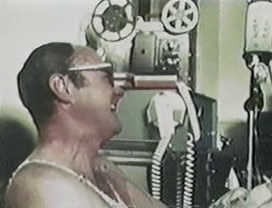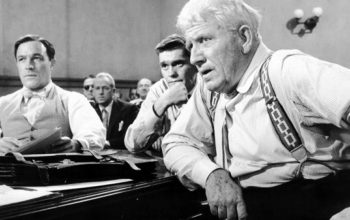In Search Of… S05E08 – S05E12 Omnibus Edition

I’ve been going a little slower on the ‘In Search Ofs…’ lately. Partly I’ve had other things on my plate, and partly because Season 5 has been getting a little boring. It came thundering out of the gate with the ‘UFO Cover Up’ episode, craziness like Daredevil Death Wish and the stylistically interesting Moon Madness, but there has also been dullness like Lee Harvey Oswald, and Life After Life.
The next four episode stretch is: two True Crime episodes, and three alternative medicine episodes, and I just can’t be bothered making a new post for each of them. So here’s my first (and probably not last) In Search Of Omnibus Edition. After this run of five, we get to Salem Witches which I’m sure will be awesome, awful or awesome and awful. Looking forward to that.
S05E08: The Lindbergh Kidnapping
One of the most famous trials in 20th Century America, and like all famous trials, it’s proof that fame + trial doesn’t always = justice.
Long story short: infant son of famous aviator Charles Lindbergh is kidnapped for ransom, sadly dies, and just as sadly almost certainly the wrong man is executed for the crime. It’s an okay episode if you aren’t familiar with the case. If, like myself, you’ve seen one of more other documentaries on the Lindbergh Kidnapping, there’s nothing particularly special about this version. There’s a lot of old footage, a couple of talking heads… the usual. The idea that the man who was convicted and executed was probably innocent sounds like an In Search Of innovation, but it’s pretty much the standard interpretation of the trial, and has been almost since they pulled the switch. As the parent of a small child, I find the whole thing extremely discomforting to think about, so personally I find it hard to see the entertainment value of it, but your mileage may vary.
S05E09 Accupuncture
In the late 1970s, there was some talk about acupuncture possibly becoming part of the standard arsenal of Western medicine, but it came to nothing. Does it actually work? My research consisted of asking a doctor, who shrugged.
In terms of the episode itself, the really interesting thing is, I believe this is the first time that the show has examined a traditional Eastern belief and talked to some actual, you know, Asian people about it, rather than just groovy white Bay Area types. I mean, they talk to those people too, but… actual Asian people, folks. In Search Of… cameras actually film a surgical operation in China, apparently carried out using acupuncture instead of pharmaceutical anaesthetics. And remember, this is 1980 – for a US crew, getting permission to film in China was a much bigger deal than it is now. I’m actually kind of impressed that the producers went to the effort.
S05E10 Jimmy Hoffa
Like Oswald and the Lindbergh Kidnapping, this is pretty well-trodden ground; though in fairness, it wasn’t so well-trodden in 1980. Hoffa was the head of the (extremely!) powerful Teamsters Union. I’m sure there are some good works somewhere putting him in context with the history of the labour movement in the US, but to TV shows and movies, he’s pure True Crime fodder, so don’t expect much of that. This one actually doesn’t go as hard on his alleged mob ties as later documentaries do — the union-bashing of the Reagan years was in the future, after all.
Anyway, good archival footage, big unanswered question as to his disappearance.
S05E11 Fountain of Youth
There’s mention of the Spanish explorer Ponce de Leone early on, but this one isn’t about the actual fountain of legend, but about people fighting the aging process. It’s a grab bag, honestly. Nimoy claims that there are as many ideas for fighting aging as there are people to have ideas. We see Nimoy lifting weights in a gym, we talk to a gerontologist (who believes that we will be able to slow the aging process within a century), we go to a health resort for the elderly in Mexico, a grey-haired woman who has had a facelift (with surgical footage), the founder of the Senior Olympics, a spry old fellow who was once Mr America, an alleged wonderdrug called gerovitol, a diet-and-exercise based anti-aging treatment, back to the gerontologist, some scientists injecting stuff into mice.
I’d need to know a lot more about the state of gerontology in 1980 to even guess how sensible this stuff is, but the only common idea is that exercise and good diet are helpful. Which seems like a good idea, I guess?
Honestly, not one of the more coherent episodes.
S05E12 Laugh Therapy
Near as I can tell a journalist called Norman Cousins was diagnosed with a disease of the connective tissue, and given little chance of recovery. He came up with a treatment regime of his own, which included vitamins and laughter. He recovered and wrote a book about it. A terrible movie was made about his book. I know this because I watched it, due to a combination of insomnia and lack of streaming services in the 90s. Cousins called his self-administered treatment ‘laugh therapy.’
The episode doesn’t start with Cousins, for some reason. It starts with some poetical narration about laughter, and wonders what it’s physiological purpose is. Then we move onto the idea of the idea of the placebo, and talks to a doctor who is an expert in placebo effect. They look at biofeedback, and the researcher there says that he’s not sure if the improvements he’s seeing in patients is placebo or not. The producers miss the hell out of the point of this, seeing placebo effect as proof of the mind’s ability to heal the body or some 1970s crap.
And then Carl Reiner (!) turns up, and we just watch him laugh for a while. This is, of course, fucking awesome. It’s followed by old footage of Steve Allen laughing, followed by Allen interviewed, and talking very seriously about laughter. Followed by Reiner talking about how laughing feels good. Less amusing, a clown who performs in a children’s hospital. Also interesting is a stand-up comedian who has CP, but we seem to be getting further from the topic
Long story short, Cousins had an eccentric idea about healing which may or may not have been instrumental in helping him. Personally, this is the first time I’ve heard of it since watching that stupid movie, so I guess it’s gone out of fashion? This episode doesn’t really go into it much, being a bit of an unfocussed mix of actual doctors talking about medicine and comedians talking about how comedy feels good. It has to be the most unfocussed episodes in the series, just flickering at random between ‘laughter is important to our wellbeing’ and ‘laughter is literal medicine.’ And Nimoy’s closing narration is delivered in front of a comic book display, which is hilarious, because near as I can see none of them are humour titles.
Conclusion
There you have it. Two quite reasonable, if not entirely engaging, True Crime episodes and three Alternative Medicine episodes, each less focussed than the last. Not a great run in the shows history. Perhaps if the producers knew they were going to last six years, they would have parcelled out the classic supernatural stories a little more evenly, rather than dumping so many of them in the early seasons.



